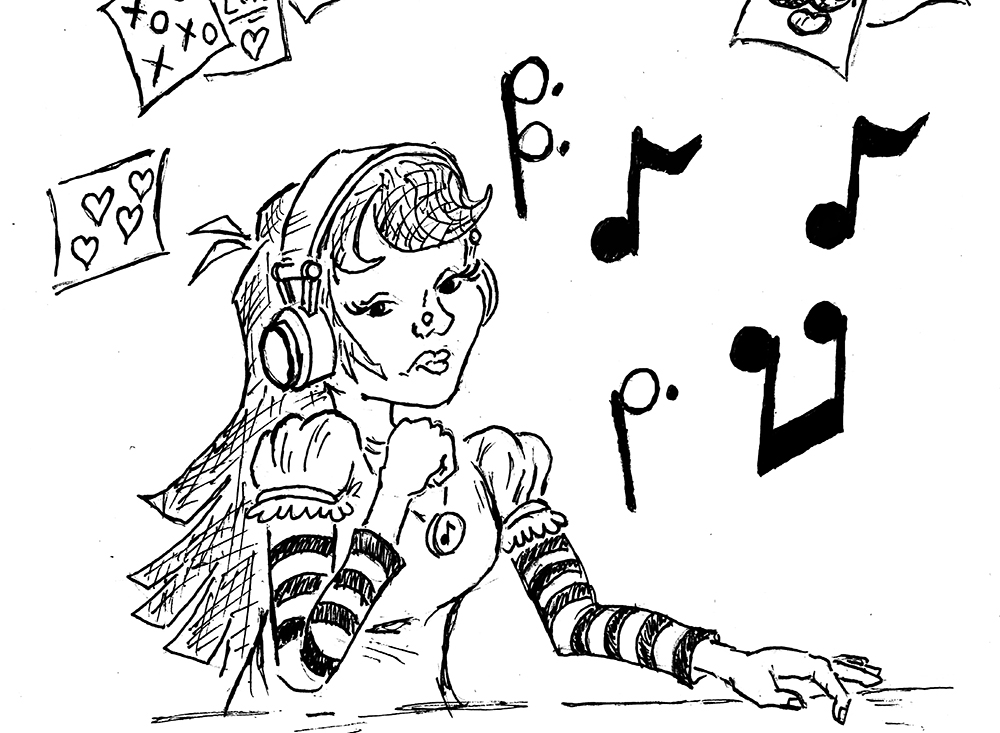Golnaz Taherian | Contributor
Featured illustration: You’ll have no trouble putting together a playlist for Valentine’s Day night with an abundance of love songs. | Christopher Lai
Have you ever wondered why most songs are about love and sex? Flipping through your playlist, MTV top 100 music videos or even the radio, it seems impossible to find a song that doesn’t make reference to one, the other or both.
On the one hand, love and sex are global experiences; it makes sense that music about these two themes is so popular. But on the other hand, there lies a potential that this music is just easier to market and sell to consumers.
Music can be considered free therapy and therapists are beginning to incorporate an aspect of music in their practices. So could the mass production of these types of songs be acting as free therapy for the masses?
There are many stories about the origin of love songs. One belief considers ancient Greece as the dawn of love songs. Ancient Greek poems demonstrate that love and sex play major roles even in war poems. “The Iliad” is about the Trojan war, prompted by Paris stealing Helen from her husband. Even though the poem is about war, it was love and sex that sparked the fall of Troy.
On the other hand, some critics believe that the love song was invented in the Middle East and Africa. Claims that history has ignored the influence of non-Western cultures on love songs have been made—people of colour have been singing about themes of love and sex for years.
Regardless of the origin, it is certain that love songs are dominant subjects around the world, despite traditions, religions or cultures.
Recently, Ed Sheeran released the songs “Shape of You” and “Castle On The Hill.”
“Shape of You” is about love and sex; “Castle On The Hill” is about childhood memories and hometown friends. “Shape of You” sold 227,000 copies in its first week in the United Kingdom, was streamed 20 million times in the United States in its first week and debuted at number one on the Billboard Hot 100.
“Castle On The Hill” sold 193,000 copies in its first week in the United Kingdom and 13 million streams in its first week in the United States. It debuted at number six on the Billboard Hot 100.
Even though there is arguably more depth to “Castle On The Hill,” these numbers demonstrate people’s obsession with songs about love and sex.
“[Love songs are] not only about commercializing love and sex, but also about encouraging the most immediate desires and making it seem as though it is acceptable to stop thinking with our heart and only strive to satisfy our animal instincts,” says Merna Fatohi, second-year sociology student.
“I personally prefer classic music and jazz because for me, it has always been about feelings rather than just mere shallow desires.”
Superdrug Online Doctor conducted a study on the usage of love and sex as popular themes in music. The survey looked at songs on the Billboard charts from 1960 to 2014. Love was mentioned more than 10,000 times and sex peaked at more than 1,500 times.
Mentioning love in songs was at its high point in 1988, however, mentioning sex reached its high point in 2009. According to Evolutionary Psychology, 92 per cent of top 10 Billboard songs are about sex.
“Love songs are so easy to connect to because many of us experience different kinds of love and that relatability hooks me in. Acoustics are the best kind of love song because they are unplugged and raw,” says Jasmin Cuntapy, second-year English student.
Recent love songs have also highlighted people who exist outside of heteronormativity. Hozier’s “Take Me To Church” was inspired by the hypocrisy of the Catholic church which he witnessed, particularly against sexuality and sexual orientation. The accompanying music video depicts the cruelty and hatred towards homosexuals and is meant to be a critique against anti-homosexuality in the church.
One scene depicts two gay men tortured by others. Hozier aims to question the humanity of people who insult those outside of heteronormativity or value brutalization.
Lady Gaga has been praised for her stance on LGBTQ+ issues, self-confidence and self-esteem, most notably in her song “Born This Way,” among others.
“I believe songs are going more towards the LGBTQ+ friendly direction. Lady Gaga has proudly stood up for that community through her music, which promotes equality for all [… Many other artists are] going toward the same direction,” says Sara Zehri, fourth-year kinesiology student.
Love songs can be considered an equal trade between singers and the audience. Most people cannot express their emotions through beautiful poetic phrases and love songs are accessible to illuminate those emotions. The advantages of songs about love and sex are shared, but only one of the two parties goes home with a cheque.




